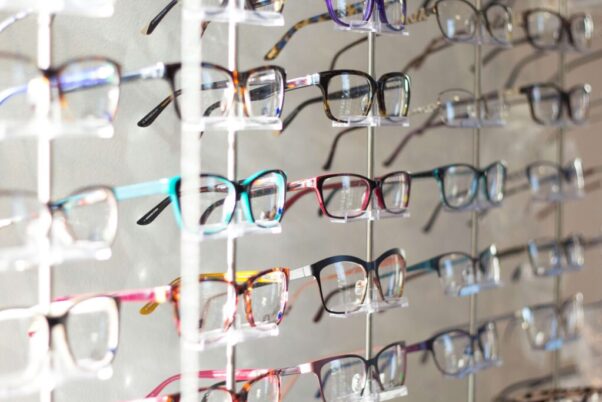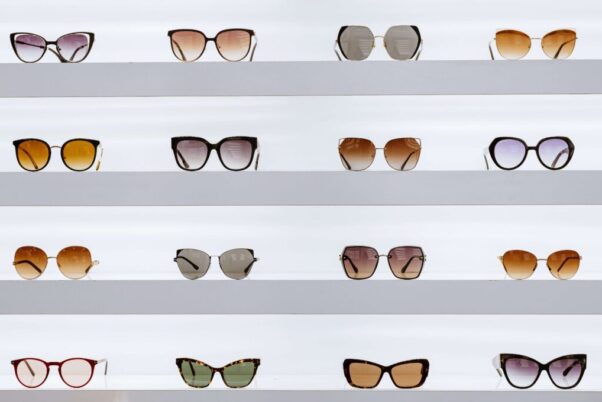The Different Types of Glasses Lenses and Coatings: How to Choose the Best Lens Type
Discover the perfect lenses for your glasses! This guide explores various lens types, coatings, and materials to help you choose the best option for your vision needs and lifestyle.
Welcome to the definitive guide on the types of lenses for glasses, brought to you with the expertise and care you’ve come to expect from Poudre Valley Eyecare, Fort Collins’ trusted eye doctor. Today, we’re diving deep into the heart of eyewear technology to ensure you find the perfect lenses for your glasses.
If you’re not sure which type is the best lens for your vision needs and lifestyle, this article is for you. If you’re looking for the top eyewear trends of 2024, we’ve got a guide for that, too.

Understanding Eyeglass Lenses
The adjustment to new glasses is a unique experience for everyone. The time it takes to get used to new glasses varies based on several factors, including changes in prescription, the type of lens, and the fit of the frame. Most optometrists recommend giving your new prescription two to three days to get used to. Sometimes it takes more like two to three weeks to get used to new specs. If you changed the size, shape, or type of eyeglass lens, this can make the new glasses feel even weirder.
Types of Lenses for Glasses
Single Vision Lenses
Single-vision lenses cater to one focal length, perfect for consistent vision correction across various activities. The entire lens is designed for one type of vision correction. They’re the go-to for clear sight, whether you’re poring over a book or gazing at a distant horizon. Single-vision lenses are great for people with nearsightedness, farsightedness, or astigmatism (though they don’t treat nearsightedness and farsightedness at the same time).
Bifocal Lenses
Bifocal lenses feature two distinct optical powers, typically separated by a visible line across the lens. The upper part of the lens corrects distance vision, while the bottom of the lens aids in near-vision tasks such as reading. Bifocals are the best lens type for individuals who require both near and distance vision correction in a single pair of glasses.
Trifocal Lenses
Trifocal lenses offer three distinct focal points: distance, intermediate, and near vision, each occupying a different portion of the lens. Unlike bifocals, multifocal lenses come with a middle segment for intermediate vision tasks such as computer work. Ideal for individuals with multiple vision correction needs, trifocal lenses provide clear vision across various distances, essentially catering to a full field of vision. These lenses are ideal for older folks with advanced vision problems.
Progressive Lenses
Progressive lenses, also known as no-line bifocals, offer a seamless transition between different focal points, enhancing the wearer’s field of vision without the interruption of lines. Unlike traditional bifocals or trifocals, progressive lenses feature a gradual change in prescription from the top of the lens to the bottom. This allows for clear vision at all distances without the distraction of visible lines on the lens. Again, progressive lenses are ideal for people seeking vision correction for nearsightedness and farsightedness in one pair of glasses.
Types of Lens Materials
Glass Lenses
Glass lenses were once the standard choice for eyeglasses due to their optical clarity and scratch resistance. However, they are heavier and more prone to breakage than modern plastic alternatives. While glass lenses are still available, many people opt for lighter and safer prescription lenses, with options such as tinted lenses also adding an aesthetic appeal.
Plastic Lenses
Plastic lenses, made from lightweight materials like CR-39, offer excellent optical quality and impact resistance. They are a popular choice for eyeglasses due to their durability and affordability. Additionally, plastic optical lenses can be easily tinted or coated to enhance their performance and appearance.
Polycarbonate Lenses
Polycarbonate lenses are highly impact-resistant and are commonly used in safety glasses and sports eyewear. In addition to their durability, polycarbonate lenses are lighter and thinner than traditional plastic lenses, making them ideal for people with active lifestyles or children who may be prone to accidents.
High-Index Plastic Lenses
High-index plastic lenses are designed to be thinner and lighter than standard plastic lenses. By using advanced materials with a higher index of refraction, these lenses can effectively correct vision in a thinner profile. High-index lenses are particularly beneficial for people with higher prescriptions who desire a more cosmetically appealing option.
Prism Lenses
Prism lenses correct binocular vision issues, such as double vision or eye misalignment, by bending light to realign visual fields, creating a single image. Ideal for those with diplopia or strabismus, these lenses can help with depth perception and reduce eye strain, improving visual comfort and functionality.
Specialty Lens Types
Photochromic Lenses
You may know photochromic lenses as transition lenses. These corrective lenses darken in response to sunlight exposure and lighten indoors. This adaptive feature provides convenience and protection from harmful UV rays without the need for separate prescription sunglasses. This type of prescription lenses are a versatile option for individuals who don’t want to wear sunglasses over their glasses
Polarized Lenses
Polarized lenses reduce glare from reflective surfaces such as water, snow, and roads. By filtering out horizontally oriented light waves, polarized lenses enhance visual clarity and reduce eye strain in bright conditions. These lenses are an excellent choice for outdoor activities such as fishing, skiing, and driving.
Blue Light Blocking Lenses
With the increasing prevalence of digital devices, computer lenses have become essential for many individuals. Blue light-blocking lenses help protect your eyes from the harmful effects of blue light emitted by digital screens. Prolonged exposure to blue light can lead to digital eye strain, disrupt sleep patterns, and contribute to long-term eye health issues. Blue light-blocking lenses block out a portion of blue light, reducing eye strain and promoting healthier vision in today’s digital world.

Lens Coating Options
Anti-Reflective (AR) Coating
Anti-reflective coating reduces glare and reflections on the surface of eyeglass lenses, improving clarity and comfort. By minimizing distractions caused by reflections from indoor lighting and computer screens, AR coating enhances visual acuity and reduces eye strain. Additionally, AR coating makes lenses appear nearly invisible, allowing for a more natural appearance.
Scratch-Resistant Coating
A scratch-resistant coating adds a protective layer to eyeglass lenses, reducing the risk of scratches from everyday wear and tear. This durable coating helps maintain the integrity of your lenses, ensuring long-lasting clarity and optical performance. By preserving the quality of your lenses, the scratch-resistant coating extends the lifespan of your eyeglasses and enhances your investment.
UV Coating
The UV coating blocks harmful ultraviolet rays from reaching your eyes, providing essential protection against UV-induced eye damage. Prolonged exposure to UV radiation can lead to conditions such as cataracts, macular degeneration, and corneal sunburn. UV coating as lens treatment helps safeguard your vision and reduces the risk of UV-related eye health issues, particularly in outdoor settings.
Choosing the Right Lenses for Your Eyes
When selecting eyeglasses for your face shape and eye needs, several factors should be considered to ensure optimal visual performance and comfort. Your lifestyle, budget, and vision needs play crucial roles in determining the most suitable lens options for you. Consulting with an eye doctor can provide personalized guidance and recommendations based on your preferences and requirements.
How to Maintain Your Optical Lenses
Proper maintenance and care are essential for preserving the quality and longevity of your eyeglass lenses. To keep your lenses clean and clear, follow these simple tips:
- Use a mild soap and warm water solution to gently clean your lenses.
- Avoid using abrasive materials or harsh chemicals that may damage the lens surface (this applies to glasses and sunglass lenses).
- Use a microfiber cloth to dry and polish your lenses, removing any smudges or streaks.
- Store your glasses in a protective case when not in use to prevent scratches and damage.
- Schedule regular eye exams at Poudre Valley Eyecare to ensure your prescription is up-to-date.
Key Takeaways
-
Lens Types: Choose from single vision (one focal length), bifocal/trifocal (multiple zones), or progressive (seamless transition) based on your vision needs.
-
Materials Matter: Opt for lightweight polycarbonate (durable) or high-index plastic (thinner for strong prescriptions); avoid heavy glass.
-
Specialty Lenses: Consider photochromic (light-adjusting), polarized (glare reduction), or blue light-blocking (digital eye strain) for lifestyle-specific benefits.
-
Coatings Enhance Function: Anti-reflective (glare reduction), scratch-resistant (durability), and UV (sun protection) coatings optimize lens performance.
-
Consult a Pro: Lifestyle, budget, and prescription strength determine the best fit—schedule an eye exam for personalized recommendations.
Let Us Help You Find the Right Lenses & Frames
Selecting the right lenses is essential for maintaining clear vision and protecting your eye health. At Poudre Valley Eyecare and our partners, Eyemart Express, we can recommend the best lenses for your lifestyle and vision needs. Whether you need glasses or contact lenses, we can handle your comprehensive eye exam in Fort Collins and have your eyeglass frames with finished lenses available within one hour!
From single vision to progressive lenses, our range of options at Eyemart ensures that you find the best eyeglass lenses for your vision correction needs. Whether you’re seeking protection from harmful UV rays with polarized or blue light-blocking lenses, or enhancing your visual comfort with anti-reflective coatings, we have the expertise and technology to help.
We encourage you to consult with our experienced eye care professionals who can provide lens recommendations to help you choose the best lenses for your unique circumstances. By scheduling an eye exam with Poudre Valley Eyecare, you’ll take the first step towards clearer vision and healthier eyes.
Remember, your vision is our priority. Let us help you see the world with clarity and confidence. Contact us today for your Fort Collins eyeglasses appointment.
FAQs
-
Who can help me choose the best lenses in Fort Collins?
-
What are the best lenses for blue light protection?
-
Where can I get progressive lenses in Fort Collins?
-
Why should I choose polycarbonate lenses?
-
How do I know which lens type is right for me?
-
Will photochromic lenses work indoors and outdoors?
-
What lens coatings are best for reducing glare?
-
How long does it take to adjust to new glasses?
-
Where can I find affordable high-index lenses in Fort Collins?
-
Why are anti-reflective coatings important for eyeglasses?
Dr. Eric Torgerson
Owner at Poudre Valley Eyecare
Dr. Eric Torgerson is the owner of Poudre Valley Eyecare, and has been recognized for his contributions to optometry and his commitment to community health through various roles and accolades within the Northern Colorado Optometric Society and the Colorado Optometric Association.
Why Choose Us?
Our advanced technology and individualized care deliver results for patients of all ages. Our routine exams allow us to spot changes in your vision and allow us to treat those changes early. We have a comprehensive understanding of eye care, which means we can treat a wide range of conditions and chronic diseases. Our in-depth routine exams and customized treatment plans set us apart from the rest.




